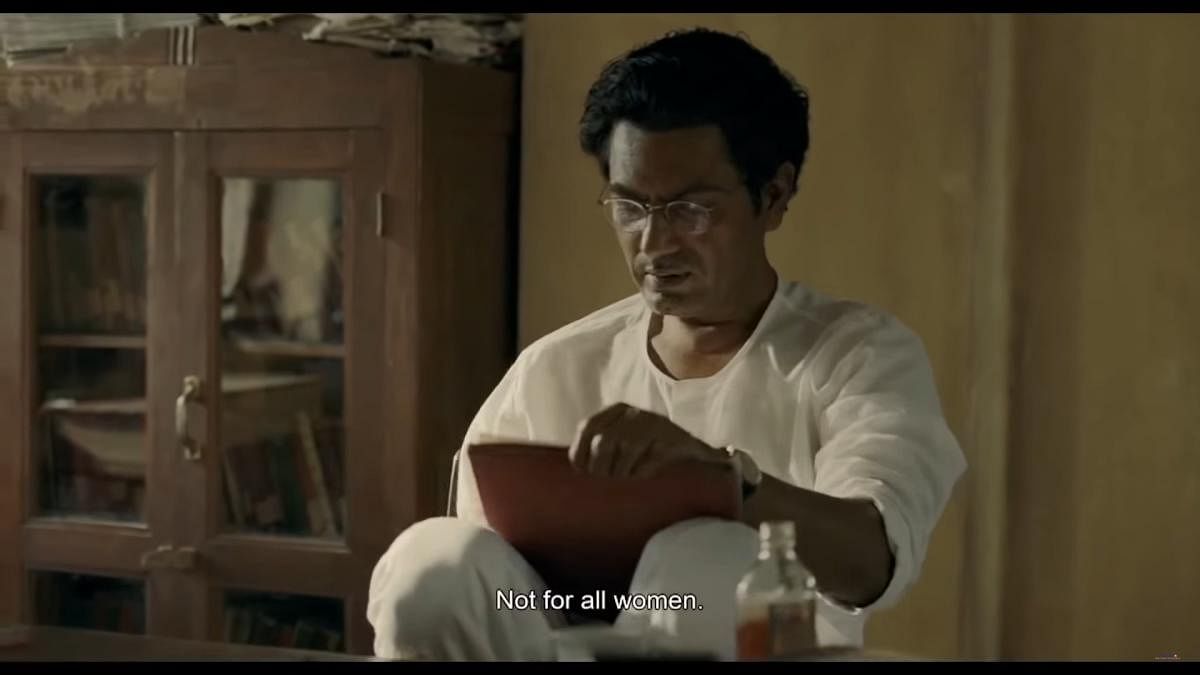Nandita Das’ ‘Manto’ hit the theatres last Friday and it caught everyone’s eye as it is one of the few Bollywood biopics made on writers. The biopic features Nawazuddin Siddiqui in the role of writer Saadat Hasan Manto. The movie also stars Rasika Dugal, Tahir Raj Bhasin, Rishi Kapoor and Danish Husain.
Even though biopics are becoming a popular theme in movie industries across languages, mostly these films are based on actors, sportspersons, politicians or characters from history. Mahakavi Kalidasu (Telugu), Kaviratna Kalidasa (Kannada), Aami (Malayalam), Bharathi (Tamil) and now Manto are few movies where the focus is on a writer/poet.
“It is not the kind of material that Bollywood is used to. Maybe a writer’s life isn’t dramatic enough, I think people don’t want to invest in it, especially when there are stars and sportspersons you can make movies on.”
Would like to see a movie on:
“Ismat Chughtai or Amrita Pritam, because they were way ahead of their time.”
- Carol D’souza, Research Scholar, Department of Humanities and Social Sciences, IIT Madras
“People do not like reality; they prefer fiction and drama. The story has to be tweaked to people’s likings. It is a good idea to make movies about writers; these would help understand the writer’s life and their work. Reading their work provides a reflection, but while watching a movie, we come face-to-face with the writer.”
Would like to see a movie on:
Sahitya Akademi Awardee, Chandrashekhara Kambara who faced many hardships in life and succeeded.”
-Dr Siddalingaiah, poet, writer, activist and politician
“The imperatives of a feature film do not align with the interests of writers. Therefore, I don’t think they are the first choice.”
Would like to see a movie on:
“P Lankesh; I consider him a genius. For some reason, there is systematic marginalisation; somehow people feel threatened or insecure to talk about the integrity and genius of Lankesh.”
- Dr R Rajaram, Head of the English Department, St Joseph’s College of Commerce
“It has to be parallel to mainstream cinema; the portrayal has to be tweaked to suit popular sentiment which may make it lose the effect. It is a difficult job to portray a writer of significance; the portrayal needs to be done with a fine brush, not a crude one. Unless you do an honest portrayal and have a good script, it won’t turn out to be a good job.”
Would like to see a movie on:
“Ismat Chughtai. She is an interesting woman, a contemporary of Manto.”
- Sujaya Sundaram, English Professor, Mount Carmel College.
“Basically, there is very little recorded about writers. In a certain sense, they try to be private.”
- BN Goswamy, art critic and historian, former vice chairman of the Sarabhai Foundation of Ahmedabad
Who was Manto?
Saadat Hasan Manto was a novelist, playwright, essayist, screenwriter and short story writer. He was born on 11 May 1912 in Ludhiana, Punjab and later moved to Lahore in Pakistan after the partition. He was politically active till the last days of his life.
Manto wrote mainly in Urdu and was a controversial short story writer. He mainly wrote about the chaos that prevailed during and after the Partition of India in 1947. ‘Tamasha’, based on the Jallianwala Bagh massacre at Amritsar, is his first story. His earlier works depicted socialist and leftist leanings but progressively took to portraying the darkness of the human psyche.
Manto was posthumously awarded the Nishan-e-Imtiaz award on August 14, 2012. Toba Tek Singh, Thanda Gosht, Bu, Khol Do, Kaali Shalwar and Hattak are a few of his notable works.
Manto's Quotes
"A writer picks up his pen only when his sensibility is hurt.”
Manto to a court judge
"If you find my stories dirty, the society you are living in is dirty. With my stories, I only expose the truth.”
On his writing
"We’ve been hearing this for some time now — Save India from this, save it from that. The fact is that India needs to be saved from the people who say it should be saved.”
Why I Write: Essays by Saadat Hasan Manto
"..and it is also possible, that Saadat Hasan dies, but Manto remains alive.”
